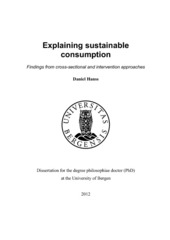| dc.description.abstract | Consumers can contribute to sustainable development if they choose environmentally friendly and fair trade products (i.e., sustainable products) in their everyday grocery shopping. On the downside, the purchasing of sustainable groceries often requires extra effort because, for example, many sustainable products are more expensive than conventional products. What is more, the beneficial effects of sustainable consumption, such as environmental preservation, materialize over time as a result of repeated purchases by many people. Because collective efforts are needed to achieve sustainability, individual consumers may be uncertain about whether their own purchase decisions make a difference. This research project addressed the question of what may motivate consumers to purchase sustainable groceries despite the uncertainties and individual drawbacks that are associated with sustainable consumption. There were two main objectives: first, to investigate some of the individual characteristics that may distinguish frequent buyers of sustainable groceries from less frequent buyers; second, to provide insights into how consumers can be encouraged to purchase sustainable groceries. To these ends, two studies were conducted. Study 1 was an online survey that addressed the first objective. More precisely, the purpose of the study was to investigate how well social values, time perspective, and self-efficacy predict the purchasing of sustainable groceries. In the domain of grocery purchasing, these individual characteristics had not been studied together before. As for self-efficacy, both general and sustainable development self-efficacy were explored. The former refers to people’s perceived general ability to deal with stressors and to achieve desired outcomes, whereas the latter refers to the degree to which people feel able to contribute to sustainable development, a construct that had not been studied before. It was assumed that pro-social values, a long-term time perspective, and high self-efficacy characterize consumers who frequently purchase sustainable groceries. Consumers who purchase sustainable groceries less frequently, in contrast, were assumed to attach importance to pro-self values and to have a short-term time perspective and low self-efficacy. Taking part in the study were 402 people living in the municipality of Bergen (Norway). The findings of this study are reported in two papers: Paper 1 introduces the construct of sustainable development self-efficacy and explores its dimensionality. It also reports the relations between sustainable development self-efficacy, general selfefficacy, and the purchasing of sustainable groceries. It was found that different facets of sustainable development self-efficacy can be distinguished. Most importantly, the perceived ability to directly contribute to sustainable development (i.e., by one’s own actions) was represented by facets which are different to those which represent the perceived ability to indirectly contribute to sustainable development (i.e., by encouraging other people to engage in sustainable behaviors). In sum, the perceived ability to indirectly contribute to sustainable development predicted sustainable consumption better than the perceived ability to directly contribute to sustainable development. General self-efficacy was weakly related to sustainable development self-efficacy but unrelated to the purchasing of sustainable groceries. Paper 2 reports the relations between social values, time perspective, sustainable development self-efficacy, and the purchasing of sustainable groceries. With regard to self-efficacy, people’s perceived ability to indirectly contribute to sustainable development was investigated. It was found that social values, time perspective, and self-efficacy accounted for non-overlapping parts of the variance in sustainable consumption. The relations between the focal variables were generally in the expected directions. Study 2 was an intervention study that addressed the second objective. It investigated whether consumers can be encouraged to purchase sustainable groceries with the help of an informational intervention. The main focus of the intervention was to provide information on how individual consumers can contribute to sustainable development and how an individual’s contribution to sustainable development may encourage other consumers to join in. The effects of the intervention on both sustainable development self-efficacy and sustainable consumption (i.e., purchasing intentions and actual product purchases) were assessed. The participants were 145 people living in the municipality of Bergen, who were randomly assigned to one of two groups: an intervention group and a control group. The results of the second study are reported in Paper 3. It was found that the intervention strengthened intentions to purchase domestic and seasonal products and certified ecological products. In addition, the intervention promoted the actual purchasing of ecological and fair trade products. Self-efficacy was, however, not affected by the intervention. Thus, the increased preferences for sustainable groceries in the intervention group cannot be explained by changes in self-efficacy. In sum, the results of this research project show that consumers who purchase sustainable groceries on a regular basis tend to attach importance to the welfare of others, consider the long-term future consequences of their actions, and believe that they can personally contribute to sustainable development. Furthermore, consumers can be encouraged to purchase sustainable groceries by being provided with information about how individuals can directly and indirectly contribute to sustainable development. These findings inform theorists, politicians, and activists who intend to contribute to the promotion of sustainable consumption. | en_US |
